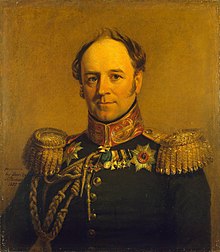Alexander von Benckendorff

Constantine Alexander Karl Wilhelm Christoph (from 1832: Count) of Benckendorff ( Russian Александр Христофорович Бенкендорф transcribed Alexandr Christoforowitsch Benkendorf ; born June 23, jul. / 4. July 1781 greg. In Reval, today Tallinn , † September 11 jul. / September 23, 1844 greg. At sea near the island of Dagö ) was general of the Russian army and chief of 1826 as III. Division of his Imperial Majesty's own chancellery founded by the Tsarist secret police .
Life
After a German-influenced education, Benckendorff came to the St. Petersburg court through his sister, the influential married Princess Dorothea von Lieven , and began a courtly-military career there. His brother Konstantin von Benckendorff rose parallel to this to the position of Russian general and diplomat. When Tsar Paul I was murdered in 1801, Benckendorff was heavily suspected of complicity. Regardless of this, he was his close confidante during the reign of Alexander I and accompanied the emperor on all of his campaigns in Germany and France. After the battle of Prussian Eylau , he had the task of bringing the captured French eagles to Petersburg, and was awarded the Pour le Mérite by the Prussian king .
He was promoted to lieutenant general and, in peacetime, general of the cavalry and added to Grand Duke Nicholas as adjutant. As early as 1820 he was collecting information about the Decembrists . However, Alexander I did not take the warnings seriously. After Alexander's death in 1825, he helped to suppress anti-monarchist movements, namely the Decembrist revolt of December 1825, which is why he was appointed head of the gendarmerie and commander of the imperial general headquarters by Nicholas I in 1826 . As long-time chief of the Russian secret police , who was in office until 1844 , B. created an espionage network that monitored public and private life in Russia to a previously unknown extent, had numerous people arrested and deported, and obtained information from all over Europe. In addition, he exerted great personal influence on Tsar Nicholas. The tsar is said to have said: "I am replaceable for Russia, but not so Benckendorff". Eventually behind his rival Pyotr Andrejewitsch Kleinmichel , he resigned his offices, traveled to Germany in the spring of 1844 and died on the return journey on September 23, 1844.
family
Benckendorff comes from the Estonian-Swedish noble family of of Benckendorff originating in Salzwedel was. On November 8, 1832, Benckendorff was raised to the status of hereditary imperial count and appointed police minister and member of the imperial imperial council. Alexander von Benckendorf's parents were Christoph Iwanowitsch von Benckendorff (1749–1823) and his wife Anna Juliane geb. Schilling von Cannstatt (1746–1797). Alexander married Elisabeth Donetz-Sacharschewski (1788–1857) in 1817 and they had three daughters.
Web links

- Baltic Historical Commission (Ed.): Entry on Alexander von Benckendorff. In: BBLD - Baltic Biographical Lexicon digital
- Article by Alexander von Benckendorff in the Great Soviet Encyclopedia (BSE) , 3rd edition 1969–1978 (Russian)
- Genealogical handbook of the Baltic knighthoods part 2,3: Estonia Görlitz 1930
- Biographies , Chronos
Individual evidence
- ↑ Inscription on his tombstone in a cone
- ↑ Entry in the burial register of the municipality of Kegel (Estonian: Keila kogudus)
- ^ Meyers Großes Konversations-Lexikon, Volume 2. Leipzig 1905, pp. 635–636
- ^ Gustaf Lehmann, The Knights of the Order pour le mérite , p.433
| personal data | |
|---|---|
| SURNAME | Benckendorff, Alexander von |
| ALTERNATIVE NAMES | Benckendorff, Konstantin Alexander Karl Wilhelm Christoph (full name); Бенкендорф, Александр Христофорович (Russian) |
| BRIEF DESCRIPTION | Russian general |
| DATE OF BIRTH | 4th July 1781 |
| PLACE OF BIRTH | Estonia |
| DATE OF DEATH | September 23, 1844 |
| Place of death | at sea near the island of Dagö |
